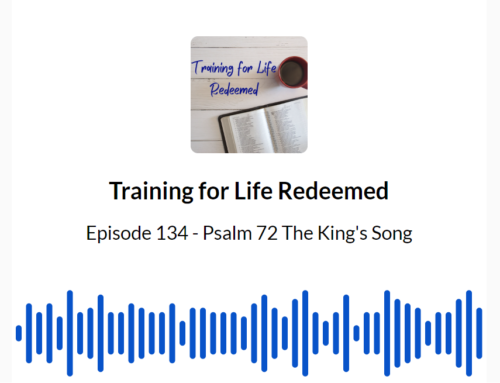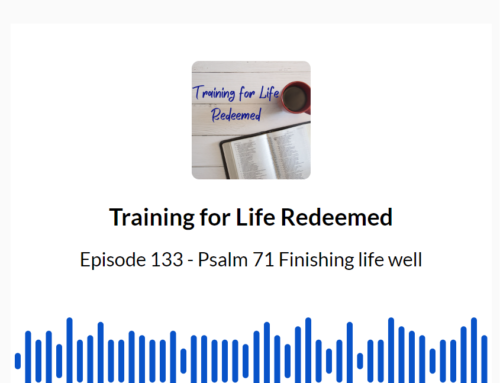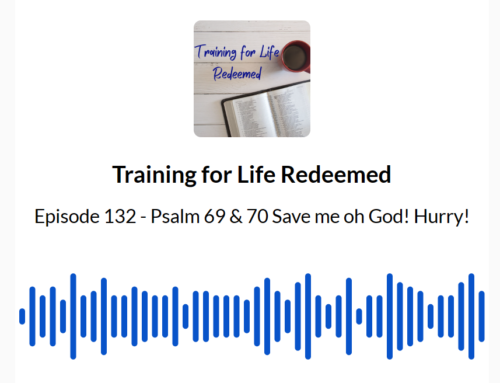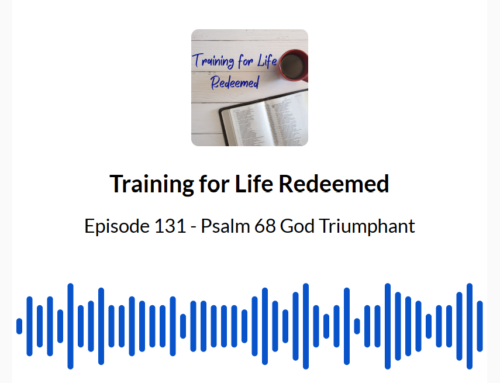By God’s grace we are more than conquerors as he hands us our new life as a gift. The battle is won but the task of living that life is ahead.
Grab your notes for this episode by completing the form
and we will send you the link to all our notes.
Transcript
Dan:
Well, hi everyone. And welcome again to training for life redeemed. I’m your host, Dan, and as always, I’m joined by my father David today. We are looking at Joshua 11 and 12. We’re finishing off part one of Joshua and Dad, We start by going into the Northern kingdom and we have lots of Kings being defeated throughout the Northern campaign, but we’re going to focus on a few things here. So let’s start with Hazor. Why are we burning Hazor to the ground, but not doing that to every other city?
David:
Okay. So Hazor is this massive city up in the north. It actually dominates the trade route from the coast , right across to Babylon and Assyria and all the Eastern places. and this is a trade route as well as a military route. So you’ve got the Jezreel valley. If you go and get the notes , we’ve put some photographs in there to show you what the land is like. If you are in Hazor you can collect taxes, you can deploy your army , you control the north. So if we take Hazor out, then all the other Kings and all the other cities and everybody else , are on their own. So this is a , is a massive campaign. Joshua takes , the Israelite army 250 K north. So how on earth he does that? tactically secretly without being detected is pretty clever. I suspect that he travelled up the, great rift valley of the Jordan, u m , which is really in 600 meters below sea level. So you’re sort of moving along that valley under the mountain range, and then you turn left and you’re at Hazor. So to take out, Hazor finally the Northern Kings and all these Canaanite Kings have said, oh , look out we, if we don’t work together, these guys are going to slaughter us. So, you know, Hazor is massing this army, all the chariots and everybody’s sort of moving into camp. And by the time they get to camp, you know, you can imagine if it was a modern army, you’re looking at a military base with rows and rows and rows of tanks, and they’re all next to each other and jammed up before they can be deployed out onto the battlefield. Joshua and his army comes down and blows them all up. As it were. He hits the chariots and he hits the army at the base camp before they deploy. and that means that the city of Hazor is wide open and he takes care of Hazor.
Dan:
So that’s why he conquers Hazor but why does Hazor get burned and the other ones don’t
David:
Okay, so you’ve got your model of Jericho. So there are cities that are designated for kherem warfare. So we leave them totally destroyed, nothing left, burned to the ground, and they’re little models of judgment day. And that sends a signal to everybody else in the Northern Canaan area, that Yahweh is bringing his judgment to bear. Now, if you had half a brain and you saw that signal, you get the heck out of it. And that’s it. That’s pretty much what people did. so the Northern part of Israel, you’ve got a Ridge that goes up to Mount Hermon. Then you’ve got anti Lebanon and you’ve got Lebanon mountain ranges with all these little valleys in between. And these people , down in this little flat area of Merom, once Joshua was taken them out, they all skedaddled. And they head mostly west , up into Sidon and then Lebanon, what we would call Lebanon and they get the heck out of there . And he burns Hazor. And the end result of that is, now we’ve just got to go clean up the individual cities, but God has said, I’m going to give you those cities. I’m going to give you their farms. I’m going to give you their animals. I’m going to give you all of their wealth. Everything that’s in It is my gift to you. You’ve just got to get all those people out of there so that they’re now going to go through and chase those people out. And then they collect everything in the cities, all the animals and everything else. So Hazor is your exemplar like Jericho? Um, Bethel and I, they were examples of judgment. And then you go and you start looting the rest of the country.
Dan:
Okay. So that then I think it was a good segue into the next section here. So in chapter 11, verse 20, it says “for, it was a Lord’s doing to harden their hearts, that they should come against Israel in battle in order that they should be devoted to destruction and should receive no mercy, but be destroyed just as Yahweh commanded Moses,” can you explain that verse? A lot of people these days will have a fair bit of problem with that because God has decided to show no mercy to these people and to devote them completely to destruction. Yeah.
David:
We’ve been raised with this enlightenment democratic idea that everybody has rights. And one of the things we’ve got to understand that the Canaanites had to understand Israel had to learn is that you are the creation of God, that he is Lord. He owns you. You don’t have rights when it comes to God. If in my relationship with other people, I have rights. There are limits on what another human being can do with me, but there is no limit on what God who created me has the right to do. And now he has told humanity, I am God, you are my creature. So live in my world, my way I’ve designed it. It’s a blessing. I give it to you. And we told him to go jump in the lake. Now, at that point, he has every right to take the whole lot of us, put us up in a little bag and go drop us in the furnace. He has that, right And he’s going to teach us that on judgment day, he is going to exercise that right, He is going to bring down his judgment on everybody who has defied him. Now, if we’re going to teach that concept, you want to teach it with an extreme example, okay? We’re not going to do it with the little example, we’re going to do it with a big example. So God hardens their heart. It basically means let’s let natural consequences work their way up. Let me give you enough rope to hang yourself. And then Israel can look at your culture and go, this is so bad. Something’s got to go down. This cannot continue. So when you get to the flood, things are so bad there’s rape. There’s murder. And God says, take it out, clean it out. It’s gone. Now we come to a city like Hazor, and he says, I’m going to show you what judgment day looks like. I’ve done it in Jericho, in the south. I’m going to do it now in the north. but you’ve got to get the message. If you tell God to go jump in the lake and you live life, you want to redesign his world and life and everything else, your way, we are going to go down big time. So let’s see how that works out. I’ve said to a few people over the years , you know, they’re all mocking God and carrying on with how you know, I’m not a believer and I’m autonomous. I can do what I like. And I ask the question, how’s that working out for you? And I’m talking to lonely, bitter, angry people, and this is what God is doing in this particular city H e’s letting things go, so that we can see how serious sin is.
Dan:
Okay? So this is like a nice example for us of what’s coming with judgment day, we then switch into a big list of Kings of Kings and Kings and Kings who came and Why, why don’t we get this huge list of things?
David:
Yeah. This is about the point where most o f t he people who are reading their Bible, they come to a passage like Joshua 12 and they go, u h, yeah, whatever. I just remember so many kids in class when you ask them to read the Bible, and I deliberately would go to a chapter like this and y ou say, okay, I’m ready. Would you like to get up and read for us? Starting at chapter 12, verse 10, the king of Jerusalem, o ne, the king of Hebron, one, the king of Yarmuth o f t he king of Lachish, Eglon Gezer, Debir, and the kids looking at y ou a gain, whatever, y ou k now, and when you go further into Joshua and t hese great lists of, you know, turn left at the Oak of, Harambe Kadesh or something, a nd people go, w ho cares? Um, so we need now to come to a point where we’re going to ask the question, why is God being so pedantic? Why do I have so much detail , place names in , places that cities that have long gone? We don’t even know where some of them are. Um, but we’re gonna work through all of these places and all of these Kings and all these characters, because when God does his thing to save his people , it’s in history. It’s a places it’s with real people in real time. And if we actually go back and look at it, we start to get an understanding of the way he goes about doing things. And there’s a plan in here. so over the next few weeks, we’re going to actually work through this part of the Bible that nobody reads. And we’re going to try and explain why that’s important. And so I like to tell the story of , you know, when the Roman emperor Constantine got converted, his mother got converted and his mother’s name was Helena and Helena, When she got converted, she really wanted to know what happened, where it happened. She wanted to go and see that it happened. So she, I mean, she’s the emperor’s mother. She’s got no end of, you know , resources, money, travel, do what you like. So she’s flying first class, she’s got, she’s got the whole security team with her . She lands at Caesarea, Maritima on the coast. She bumps into the pastor of the church there. His name is Eusebius and together they walk the land and they go to every place where everybody remembers whatever happened. And Eusebius draws up a map. And the emperor, unfortunately, sticks of whopping great church over every site you can find. So the archaeologists have got all sorts of problems. but that’s how we know where these things happen. And if we didn’t have that map and we didn’t know who these Kings were and where they lived, quite frankly, the rest of the narrative of the Old Testament would make no sense. So it’s really comfortable for us. We just flipped to the back of the Bible and look at the map, but the amount of work that has gone into drawing that map, we need to appreciate God took out real people in real time. And each one has a story and each situation is different. and really when it comes to the end of it, I want to be one of those stories where Jesus saved me and where my life and my experience, my life story is something of eternal significance and not just some, whatever that we skip over. and I think Joshua teaches us that God is the God of the detail of the individual, not just of the big picture and thank God for that, because I’m just a weeny little weed in the middle of the garden. that out of all of the cosmos, he loved me and Joshua teaches me that lesson.
Dan:
All right . So the next question I have for you, Dad is how does Joshua at this point, like we finished part one of Joshua, how does it really link forward into Jesus? Yeah . There’s kind of this idea of now, not yet. I think in Joshua where we we’ve conquered the land, and yet they’re about to go off and try and settle the land and we’ll see in Judges, you know , that they’ve really struggled to do that, but , uh, how does this link forward to Jesus for us?
David:
Yeah, well, I I’m justified by faith. God, hands me a judgment that says I’m without sin I’m guiltless, I’m innocent, it’s all paid for. And with that, he hands me, my new life. I redeemed life. But if all I do is sit there and go, you know, I’ve got the ticket. That’s great. That redeemed life amounts to nothing. I don’t experience any of the blessings Jesus died to give me. So the Christian is called a disciple, a trainee. You’re given the gift, but now you’ve got to go and open the thing and unpack it and assemble it and put it to work. And that’s why we call this training for life redeemed. He bought you the life. So he gave Israel the land, but now they’ve actually got to go and move in, occupy it, settle it, build the houses and farms and set up their agriculture or whatever they’re going to do. You’ve actually got to go and do this thing that God gave you. And so we’re going to watch how that works. and for me, as a believer, if you want to use, Joshua as a bit of a metaphor. The land that I’m occupying is my life, and I’m cleaning up all the rubbish and the mess and the damage done by Satan’s rule over my life. As I bring in the rule of Christ, the kingdom of God. And that’s, you know, you would, you, you probably don’t remember much of our house when we bought our house, 40 odd years ago, it was the cheapest house in Sydney that had electricity. So we’ve got a quarter acre block that came with a free house. The house was a demolition job, and we’ve been renovating that house ever since. And I’ve just been sitting in the front veranda with your mum and we’ve been looking out and going, you know, what was a barren wilderness that was condemned by the bank is now, you know, it would take us a year to catalogue all the plants and the things that are growing here. U m, it has flourished over that time because we’ve reclaimed a wreck. and I think that’s a good measure of what it is to be a Christian and to go out and reclaim, and actually occupy this gift that God gave us and Joshua and the people of Israel have to do that. I t’s just a little model of what it’s like to be here now saved, but not yet in new creation.
Dan:
Well, yeah, I think we’re out of time because it’s the end of our episode . So if you would like the daily notes, please head over to trainingforliferedeemed.com/42. If you enjoyed this episode, we would love if you could leave a review and please make sure you hit the subscribe button and make sure you come back next week as we begin, the second part of Joshua. Thanks.



